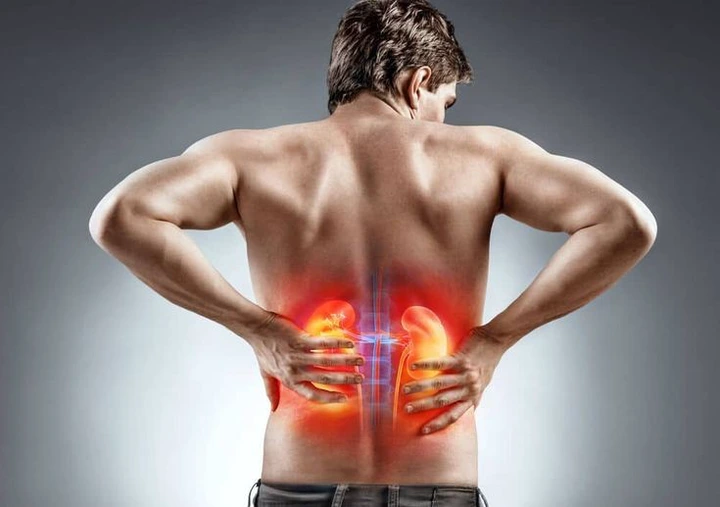Your kidneys are two pairs of bean-shaped organs which are located on either side of your body, just below the rib cage, and resting against your back muscles. They are responsible for a host of functions, with the most prominent ones being the removal of waste products and excess fluid from your bloodstream. With your kidneys resting against your back muscles, it is possible that you feel kidney pain and mistakes it for back pain.
According to Jamie Eske of Medicalnewstoday, in trying to determine whether the pain is radiating from the back or kidneys, certain factors are put into consideration. These include the location of the pain, the type and severity of the pain, and any accompanying symptoms. This article would be looking at certain main characteristics and causes of kidney pain and back pain, and how to tell the difference.
Find out more information below:
1. Kidney pain
According to Jamie Eske of Medicalnewstoday, your kidneys are susceptible to infection and damage due to the roles they play in filtering out waste and toxins from your bloodstream. There might be a buildup of substances such as calcium, oxalate, and phosphorus, in the kidneys to form what is known as kidney stones, which can be particularly painful if they cause a blockage.
However, apart from kidney stones, other conditions can make you experience kidney pain. These according, to Jamie Eske of Medicalnewstoday, include urinary tract infections (UTIs), kidney infections, blood clots in the kidneys, and trauma or injury to the kidneys.
Location
To ascertain if what you are feeling is not “ordinary” back pain, take note that kidney pain is likely to occur below your rib cage and on either side of your spine. You are likely to feel like the pain is coming from deep within your body, with the pain felt on one or both sides of your body, depending on whether a condition affects only one kidney or both kidneys. The pain can move to other areas of the body such as the sides, abdomen, groin, and thigh.
Type and severity of pain
If you are having kidney pain as a result of kidney stones, you are unlikely to feel any pain if the kidney stones are small, as these tend to pass through the urinary system without causing much pain. However, if the stones are big, intense pain that can worsen as the stone moves from the kidney to the ureters may be experienced. If your kidneys are only infected, you are only likely to feel a dull ache or soreness that remains stable.
Accompanying symptoms
Apart from the symptoms of kidney pain described above, other symptoms may help announce that your kidneys are affected. These include cloudy or bloody urine, painful urination, a persistent need to urinate, nausea, vomiting, constipation or diarrhoea, fatigue, fever, and dizziness. For severe kidney damage, the symptoms can include bad breath, swelling of the legs, ankles, or feet, shortness of breath, metallic taste, confusion, irregular heartbeat, and muscle cramps.
2. Back pain
Back pain is very common, with statistics revealing that around 80% of adults will experience lower back pain at some point during their lives. Back pain often results from problems affecting the muscles, bones, or nerves in the back, with its location, severity, and accompanying symptoms often depending on the cause. However, straining a muscle or ligament in the back is a common cause of back pain.
According to Medicalnewstoday, you may strain your back from overstretching, lifting too much weight, or using incorrect lifting techniques. Other possible causes of back pain include poor posture, standing or sitting for an extended period, abnormal curvature of the spine, injuries to the back such as fractures or falls, muscle spasms, muscle tension, tumours, and damaged, dislocated, or ruptured discs.
Certain medical conditions can also make you experience back pain. These include osteoporosis, shingles, inflammatory diseases such as arthritis and spondylitis, cancer of the spine, infections, abdominal aortic aneurysm, cauda equina syndrome, which affects the nerves at the base of the spinal cord, and endometriosis.
Location
While back pain can occur anywhere in your back, you are more likely to feel “ordinary” back pain in your lower back. According to Medicalnewstoday, most people often experience pain in their lower back, which is a sharp departure from kidney pain. Back pain is not also likely to radiate to other areas of your body such as the groin, sides, abdomen, and thigh.
Type and severity of pain
Back pain can be caused due to many factors. If it is caused by muscle pain, you may feel a dull ache or soreness, which can be triggered or worsened by certain body movements, the intensity of which can range from mild to severe and may fluctuate in response to stretching. If it is nerve pain or sciatica, you may experience a burning or stabbing sensation in your lower back, that travels to other areas of the body, especially your buttocks.
Accompanying symptoms
When you have “ordinary” back pain, other symptoms may accompany back pain. According to Jamie Eske of Medicalnewstoday, these include sharp, stabbing pain along the spine, aches or stiffness along the spine, finding it hard to stand up straight due to pain or muscle spasms, walking difficulties, numbness or tingling in the back that spreads to the limbs, inability to empty the bladder, weakness in one or both legs, loss of control over urination, and constipation or diarrhoea.

Leave a Reply